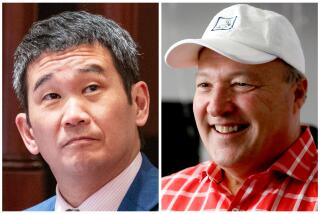Scott Baugh Is No James Curley
- Share via
Re letter from Dan Emory April 7, “Mad Cows and O.C. Republicans,” in which he states: “Baugh’s reelection in November would put Orange County in the same company with Boston (who reelected James Curley as mayor while he was in prison. . . . “
May I set the record straight? First, he was not reelected. Second, His Honor James Michael Curley was not in prison when elected to a four-year term as mayor of Boston in November 1945.
At the time, he was a congressman and under indictment for mail fraud. John F. Kennedy, discharged early from the Navy because of his back injury, succeeded him in Congress.
The trial and conviction came in 1946. He went to prison in early 1947. President Harry S. Truman commuted his sentence and released him from the correctional facility at Danbury, Conn., just before Thanksgiving in 1947.
Hundreds of people, many elderly (“He was good to the poor”), cheered his arrival at Boston’s South Station. A brass band, Jimmy Coughlan and His Lease Breakers, belted out “The Isle of Capri,” His Honor’s favorite song.
Speaking to the crowd in the resonant and polished oratorical style of Daniel Webster and Edward Everett Hale for which he was famous, he explained that while at Danbury he had the good fortune to be assigned to the prison library. “While there, I met many old friends, Aristotle, Plato, Socrates, Homer and Virgil, all of whom I had known before.”
To the shouts of “You’re the grandest man alive,” he went on to explain how he had met unfortunate and imprisoned young war veterans who were there because, “They had gone over the hill only to succor a sick parent or to help with spring plowing.” He then pledged that he would work to see that their sentences too were commuted and that justice would be done.
Finally, he explained that while in Danbury he had donated his mayor’s salary to charity.
Maybe he was a charlatan? Maybe he was a rogue? You have to admit the guy had class!
Having grown up in the suburbs of Boston, never more than 12 miles from City Hall, as an Irish Republican (a very scarce commodity), I watched his bobbing and weaving with fascination. The Yankees, around whom he ran circles, set up the Finance Commission to monitor his spending. The trouble was that its investigation was always five years behind him.
May I respectfully invite your attention to “The Last Hurrah,” by Edward O’Connell. It is a magnificent novel based on his life.
WILLIAM A. DOUGHERTY
Villa Park
* I read with interest the account of the arraignment of accused felon Assemblyman Scott Baugh (R-Huntington Beach).
The purpose of an arraignment is to call the defendant before the court to be advised of the nature of the charges against him or her and the constitutional and statutory rights that he or she will be accorded during the course of the criminal proceedings and to answer the accusation against him or her.
I have practiced law for over 20 years in Orange County. While my criminal practice has been largely confined to the defense of misdemeanor offenses, I have never, in my entire career, handled a felony criminal case in which the court permitted the accused felon to be arraigned and to answer the charges against him while he cowered in the spectator section of the courtroom at a time convenient to the defendant and outside of the regular hours when the courtroom is open for the conduct of the people’s business.
Most often felony defendants such as the “honorable” Mr. Baugh are in custody, draped in shackles and orange jumpsuits at the time of their arraignment. They stand before the court in full view of everyone in the courtroom and are required to answer the charges against them in full view of the society that they are accused of wronging.
Scott Baugh, a recently elected member of the Legislature and a key player in the election of Curt Pringle as speaker of the Assembly, is charged with one of the most serious offenses that can be charged in a democracy. He is accused of having, in effect, subverted the electoral process. He is accused by the grand jury with having acted to rob the citizens of his district of the right to a meaningful participation in the election of legislative representatives. That is indeed a very serious crime.
A person who occupies a position of trust because he holds elective office should not be permitted to hide in the back of a courtroom while proceedings are commenced to hold him accountable for his crimes. He should be treated the same way that any other accused felon is treated and not granted “special rights” by reason of his high office or because of his participation in the machinations of other local politicians.
JOHN MICHAEL COVAS
Anaheim
More to Read
Sign up for Essential California
The most important California stories and recommendations in your inbox every morning.
You may occasionally receive promotional content from the Los Angeles Times.










